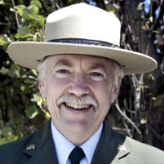Officials
Back to Officials


Offical

Name: Jarvis, Jon
Current Position: Previous Director
As with some of his other environmental appointments, President Barack Obama went with a career federal employee to lead the National Park Service. Jonathan B. Jarvis, a trained biologist, has spent the past 30 years working for the agency in a variety of positions overseeing national parks. Jarvis has said one of his primary goals as head of America’s national parks will be to implement policies that help the parks adapt to climate change in the coming years. He took over as Director of the National Park Service on October 2, 2009.
Jarvis grew up in Virginia’s Shenandoah Valley. He graduated from The College of William & Mary in 1975 with a degree in biology, and later did graduate work in natural resources management.
He began his career with the park service as a seasonal interpreter in the Washington, DC, parks. His other early work included serving as a protection ranger, resource management specialist, and park biologist. His first administrative position was as Chief of Natural and Cultural Resources in the North Cascades National Park for more than five years, making him the chief biologist of the 684,000-acre complex of two recreation areas and one national park.
In 1994, he was made the superintendent of Wrangell-St Elias National Park & Preserve in Copper Center, Alaska. Five years later he was given the same position for Craters of the Moon National Monument in Idaho, where he worked closely with local ranchers, the Bureau of Land Management, the Department of Energy, and rural communities surrounding the national monument. In 1999, Jarvis became the superintendent of Mount Rainier National Park in Ashford, Washington.
In 2001 he completed his training in the Senior Executive Service Candidate Program of the Department of the Interior. The next year, Jarvis was elevated to regional director for the Pacific West Region. In this position he oversaw 3,000 employees and a $350 million annual budget, along with all national parks and programs in Washington, Oregon, Idaho, California, Nevada, Hawaii and the Pacific islands of Guam, Saipan and American Samoa.
While serving in this capacity, Jarvis irked Senator Dianne Feinstein (D-California) with a park service report in 2007 that emphasized the negative environmental effects of an oyster operation in Northern California.
Environmentalists and historic preservationists praised Jarvis’ selection to lead the park service. Tom Kiernan, president of the National Parks Conservation Association, said, “He is well-versed in the threats to our natural and cultural treasures, and the leadership, collaboration, and cooperation needed to restore them. Jarvis fully understands the detrimental effect on the park system of long-standing federal funding shortfalls, the importance of science-based decisions, and the threats posed by climate change, chronic air pollution, inappropriate development, and the inability of the Park Service to acquire priority lands from willing sellers within park boundaries.”
Jarvis’ older brother, Destry, served as senior advisor to the assistant secretary for Fish and Wildlife and Parks during the Clinton administration.
-Noel Brinkerhoff
Official Biography (Department of the Interior)
Jonathan (Jon) B. Jarvis (National Park Foundation Leadership Summit)
Obama Nominates Jon Jarvis to Head National Park Service (Environment News Service)
National Park Service (AllGov)
- Latest News
- D.C. Public Schools will Teach all Second-Graders to Ride a Bike
- New Rule in Germany Limits Sales of Sex-Themed E-Books to 10pm to 6am
- What Happened to the 6-Year-Old Tibetan Boy the Chinese Government Kidnapped 20 Years Ago?
- U.S. Ambassador to Turkey Photoshops his Hair Color to Mock Turkish Mayor
- Mystery Artist Calls Attention to Unfixed Potholes by Drawing Penises around Them





